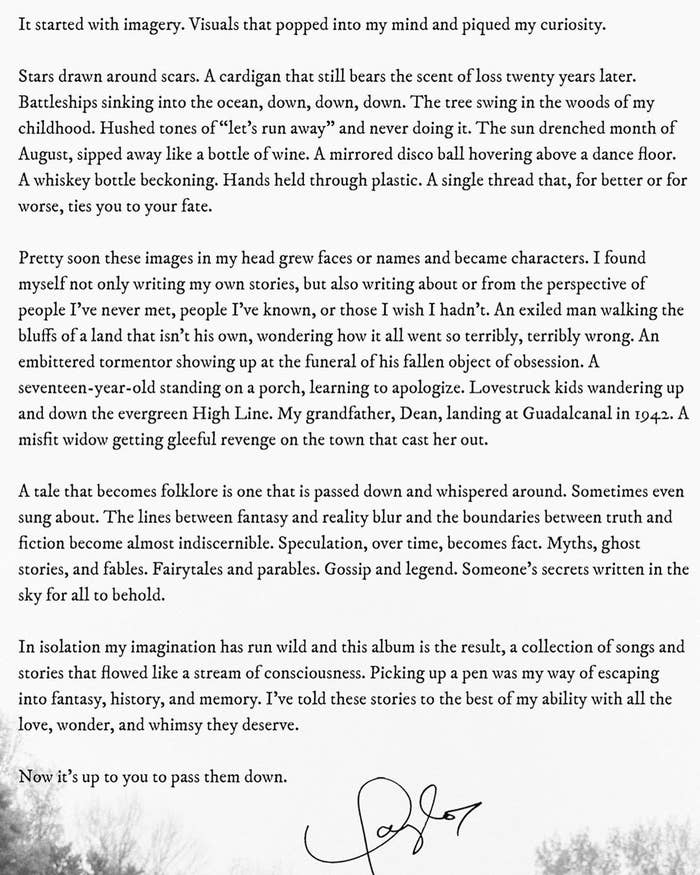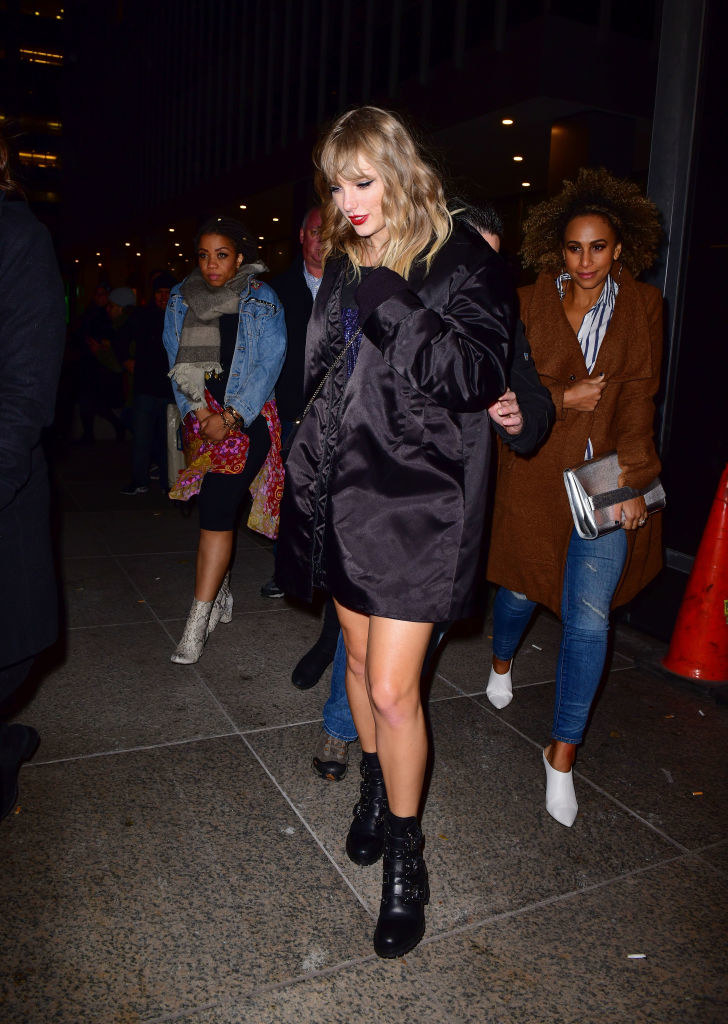"When you are young, they assume you know nothing," Taylor Swift sings on "Cardigan." Their assumptions, Taylor proves on her surprise album Folklore, would be bullshit.

Folklore is Taylor Swift's biggest swing of her career — and possibly her biggest home run. The album is like nothing she's ever done before in so many ways. Sonically, it's a blend of folk and indie instrumentals with synth beats, which makes for an easygoing, ultra-mellow listening experience.

And just when you think Taylor's writing couldn't improve, she adds another element to her craft. On Folklore, she employs a new* technique: writing about characters and other people. "I found myself not only writing my own stories, but also writing about or from the perspective of people I've never met, people I've known, or those I wish I hadn't," she said in a YouTube Q&A.

On "The Last Great American Dynasty" and "Betty," Taylor writes about a character named Rebecca. The highlight of "TLGAD" comes at its climax, when Taylor reveals she's singing about the woman who lived in her Rhode Island home before her.
Suddenly, the self-referential lyric "There goes the loudest woman this town has ever seen / I had a marvelous time ruining everything" has more bite and self-awareness than "Blank Space" or any Taylor pop song.
In "Epiphany," Taylor writes about her grandfather, who was a veteran, but draws parallels to the pain and trauma all health care workers are experiencing in the face of the coronavirus. "Something med school did not cover / Someone's daughter, someone's mother / Holds your hand through plastic now." This lyric is so brilliant because it intertwines Taylor's grandfather's experience, Taylor's experience, and health care workers' experience during these trying times.
View this video on YouTube
On "Illicit Affairs," Taylor sings, "Make sure nobody sees you leave / Hood over your head, keep your eyes down." Character-inspired or not, we know Taylor has had to deal with paparazzi and scrutiny when it comes to being in a relationship. She lets listeners know that the pain, the anxiety, the fear, in this case, is worth it. "For you, I would ruin myself a million little times."

And in "Exiled," a standout song that features Bon Iver, Taylor sings about an exhausted relationship. "I'm not your problem anymore, so who am I offending now? You were my crown, now I'm in exile, seein' you out," Taylor writes. What a quintessential Taylor Swift lyric and song. Metaphorical, acerbic, and even a taste of Fearless-era fairy tale downfall.

But part of what makes this album so brilliant, so different, and so bold is how she meshes these vivid character arcs with her own personal experiences and emotions.

On "Mad Woman," she writes about an unnamed scorned woman, yet you can feel the Reputation-era angst as she sings "And there's nothing like a mad woman / What a shame she went mad / No one likes a mad woman / You made her like that."

Taylor seems even closer to the songs "Mirrorball," "This Is Me Trying," "Peace," "My Tears Ricochet," and "Hoax." She explores the entire spectrum of relationships, love, and heartache — as if she had any more uncharted territory to cover — through her knack for metaphors and imagery. See: every Taylor Swift album ever.
But none of it seems tired or overdone. No 2 a.m.'s or kisses in the rain. Instead, she sings about love that compares to a wake, an open wound, a fire, an eclipsed sun, and a twisted knife. Whether it's about her or someone else, you can tell she's felt every word she wrote.

Another thing that struck me on this album is its exploration of mature, adult themes. Taylor's fully able to look back at relationships and value them for what they were. On "The 1," Taylor writes, "If you never bleed, you're never gonna grow." And on "Invisible String," she talks about sending an ex presents for their baby. It seems Taylor is at peace with her past. It didn't work out with some people, and that's more than OK.

Next, we have to talk about Taylor's vocals. While Taylor's peers may be focused on making the next overly catchy, viral TikTok song, Taylor seems uninterested. Folklore songs — especially "Seven," "August," and "My Tears Ricochet" — are deep, layered, packed with reverb, and breathier than ever. She sounds like Imogen Heap, the Civil Wars, and "Safe & Sound"-era Taylor.


